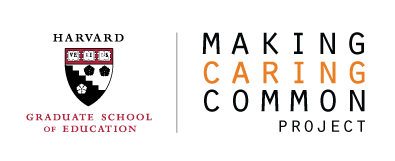5 Tips for Guiding Teens and Young Adults in Developing Healthy Romantic Relationships
As a society—and as parents—we are often failing to prepare young people for what can be most meaningful in a life: caring, healthy, lasting romantic relationships. We wring our hands about impulsive young people hooking up and debate whether to have the “sex talk” with our kids, but we tend to ignore this more important challenge. We often do very little to prepare young people for the focused, tender, subtle, generous work of learning how to love and be loved and developing a mature romantic relationship. As one teen told us in our research for our report, “All we are taught is how to prevent stuff, how not to get pregnant. We should be discussing the values that should guide you in love and how to really love and respect someone else. And how to be loved by someone else. That’s a lot more important.”
This lack of modeling and conversation about romantic relationships in both homes and schools creates a perilous void—a void that is commonly filled by popular culture. Media and entertainment promote many harmful notions about what a healthy romantic relationship is and about what love is: that love, for example, is an intoxication, an obsessive attraction; that “real love” is clear, unmistakable, and undeniable; that love happens suddenly and lasts forever. Because we don’t assume they’re harmful and thus don’t question them, media images of love may do more damage than media images of violence.
Our failure to prepare young people for romantic love can reverberate destructively throughout their lives, reflected in a range of problems including divorce, substance abuse, domestic violence, and marital conflict.
The good news is that, according to our national survey of 18 to 25-year-olds, a large majority of young people actually want some form of guidance on the emotional aspects of romantic relationships. Over 70% of respondents, for instance, wanted more information from their parents about either how to develop “a mature relationship” (38%), “how to deal with breakups” (36%), “how to avoid getting hurt in a relationship” (33%), or “how to begin a relationship” (27%). Many high school students also report wanting this guidance.
How can we as parents prepare our teens and young adults to develop healthy, caring romantic relationships? Many of us may not know what to say or feel hobbled in these conversations because we view ourselves as failures in our own romantic relationships—we don’t believe we have wisdom to share. Yet relationship failures can generate as much insight into the ingredients of healthy relationships as relationship success. What’s important is for us to distill our wisdom, which often means reflecting and consulting with adults we respect about what our past relationships illuminate about our own vulnerabilities, hopes, dispositions, and misconceptions. And the good news is that if we as older adults do this work we can often have frank, wonderful conversations with young people—even if we don’t have all the answers—that powerfully guide them, greatly enrich our relationships with them, and help us understand and develop skills in our own romantic relationships.
Overview
For: Parents and Caregivers
Ages: Middle School and High School
Resource Type: Tips
1. Be a romantic philosopher.
WHY?
There is a great deal of confusion in our culture about what romantic love is. Our research indicates that young people and adults often mean very different things when they say they’re “in love”—Tolstoy says, "there are as many kinds of loves as there are hearts"—and what people experience as love often changes over time. When a newly-married couple says they’re “in love,” they’re often referring to a quite different set of feelings than when a couple married 30 years says they’re “in love.” In part, because our understandings of love are vague and varied, young people may confuse love with infatuation, lust, idolization, or obsession. They may think, for example, that they are in love with someone because they can’t stop thinking about them. Sometimes young people may confuse love with the boost in self-esteem they experience when someone is romantically interested in them.
TRY THIS
Explore with your teen or young adult what love is and the many forms of love. What is romantic love? Have they ever been in love? What did it feel like? If they haven’t been in love, how do they think they will know when they are? Explain what you mean when you say that you are in love with someone. You might take up with your teen or young adult how love is understood in other cultures and across time—in many cultures, for example, married couples have not been expected to love each other, and the infatuation and intoxication that we have come to associate with young love in our culture these days have been treated as a madness or illness in other cultures (Ackerman, 1995; Kass & Kass, 2000). Convey to your child that they may define being in love quite differently than someone else and that there is no “right” definition of being in love. However, as we discuss below, there are ways of knowing whether intense feelings for someone else are likely to lead to healthy or unhealthy romantic relationships. Explore with your teen why and how love can be deeply meaningful and change the course of our lives.
Explore with young people how they think about different types of intense feelings about someone else. You might ask them if they think there is any difference between infatuation, attraction, and love. If so, what’s the difference? Talk about how people can be attracted to or preoccupied with other people for a range of positive and negative reasons, and discuss the importance of understanding why your teen or young adult might be attracted to or preoccupied with someone else. Are they attracted to someone at least partly because they’re kind, generous, and honest? Or are they attracted to someone because that person is elusive, seems unattainable, or mistreats them in some way? Do they feel more or less attracted to a person when that person shows less interest in them or mistreats them? Discussing these questions can give them tools for determining whether a relationship is likely to be healthy or unhealthy. Although these exercises may not stop your teen or young adult from entering a harmful relationship, they can reduce the odds, and they can help them avoid repeating harmful relationships.
2. Talk about the markers of healthy and unhealthy relationships.
WHY?
Many teens may not know if they are in a healthy or unhealthy romantic relationship. They also may be unsure if their worries, feelings of disappointment, or criticisms of their partner are normal.
TRY THIS
Examples of healthy and unhealthy relationships are everywhere in our daily lives. Talk to your teen or young adult about examples of relationships among the couples you both know, examples from the media, or both. Which examples are healthy? Which ones are harmful? Why? If your teen or young adult is in a relationship, you might also ask them if the relationship makes them more or less self-respecting, hopeful, caring, and generous. How often does the relationship make them worried or depressed? Does their partner have qualities that are concerning or troubling?
3. Talk about the skills needed to maintain healthy relationships.
WHY?
Maintaining healthy relationships requires a range of skills, including the ability to communicate honestly and effectively, to jointly solve problems, to manage anger, and to be generous. Healthy relationships also greatly benefit from the ability to zoom in—to take another’s perspective in a real and deep way—and to zoom out—to step back for a more wide-angle view of the relationship and its dynamics, strengths, and challenges.
TRY THIS
Discuss with teens and young adults various examples of caring, vibrant romantic relationships, showing how thoughtful, self-aware adults deal with common stresses and challenges and exploring the capacities and skills it takes to develop and maintain a mature romantic relationship. These examples might be relatives or friends who you think have mature romantic relationships or couples portrayed in books, television, or on film. You might watch with your teen, for instance, the compelling marriages depicted in television shows such as “This is Us,” “Black-ish,” and “Friday Night Lights.” You might also explore why a couple on TV is struggling and what skills they may lack.
4. Consider distilling and sharing lessons from your own romantic relationships.
WHY?
We can often mine our romantic experiences for insights about mature and immature forms of love and why relationships do—and do not—work. And teens and young people are often keenly interested in our experiences, in part because they’re often sorting out how they are like, and unlike, us. Consider sharing these lessons and insights in ways that are appropriate given your child’s interests and maturity.
TRY THIS
Think about what your relationships have taught you. What was healthy about them? What was unhealthy? If they were troubled in some way, why did they become that way? What attitudes or behaviors would you change if you could? Were there warning signs in your relationship or concerning qualities in your partner that you should have seen or taken more seriously? It’s often helpful to discuss these questions with trusted friends or to consult experts. Share with your teens any lessons you’ve learned about the skills, attitudes, and sensitivities that it takes to maintain a healthy romantic relationship or any close relationship
5. Engage young people in ethical questions connected to romantic and sexual relationships
WHY?
We have found that high school and college students enthusiastically plunge into ethical questions about romantic relationships: What do I do if I know my friend is cheating on his girlfriend who is also my friend? Is infidelity justified under any circumstances? Is it exploitation when a high school senior hooks up with a first-year student? Reflecting on these questions can not only help young people develop better romantic relationships, it can help them develop complex thinking and problem-solving skills, enable students to consider multiple perspectives and sort out their ethical obligations to others, learn how to ethically reason when dealing with conflicting loyalties, and take up questions about human rights and dignity.
TRY THIS
Together with your teen or young adult, puzzle through answers to the dilemmas above or other ethical questions that you develop together. Start by listening to how your teen would answer these questions and then share your own thoughts. Take multiple perspectives—for example, the perspective of the person cheating, the perspective of the person being cheated on, and the perspective of someone who the person cheating might cheat on in the future. Often there is not one “right” answer to these questions; the answer depends on many contextual factors. What are these factors? Does it matter whether the person being cheated on is a casual or close friend? How does changing these factors change the answer or outcome? Consider, too, how to resolve these dilemmas in ways that are as fair, honest, and caring as possible for all people involved.
Last updated December 2023.




